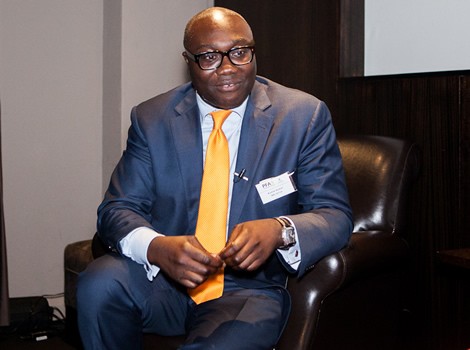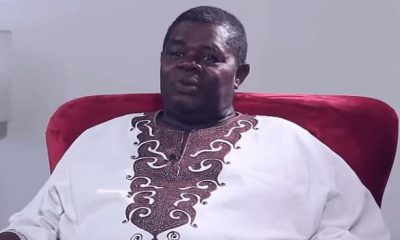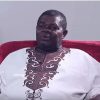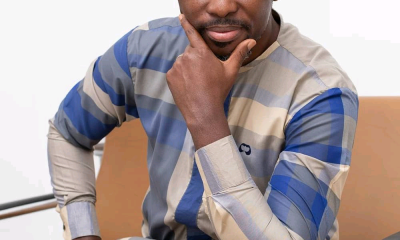 Ace Broadcast Journalist with the BBC World Service Radio, BBC World Television and presenter of BBC Africa Business Report Komla Dumor is one news personality flying high the flag of Ghana in an enviable way to a world audience. Ace Broadcast Journalist with the BBC World Service Radio, BBC World Television and presenter of BBC Africa Business Report Komla Dumor is one news personality flying high the flag of Ghana in an enviable way to a world audience.
Komla, known as ‘The Boss Player’ among his Ghanaian fans, turns 41 this October. He shot to fame in Ghana by hosting Joy 99.7 Fm’s ‘Super Morning Show’ to a discerning audience for years. He was awarded the overall best Ghana Journalist of the Year in 2003.
The Boss Player gave an insight into his career and personal life in an exclusive interview he had with television presenter, Eddy Blay.
How is life in London treating you?
Komla: Life is interesting and exciting, Eddy, it’s all about the work. I can’t say I’ve become a “Londoner”, because I spend most of my time in the studio or sleeping. I wake up and it’s back to the studio. But life is good. I can’t complain.
How’s the family? Three kids?
Komla: Yeah, the family’s doing incredibly well. Kids will be happy wherever you take them, so they’re good. They were still young when we moved up here, so they adapted well to life in London and they’re enjoying themselves.
Do you miss Ghana much?
Komla: Oh yes! I miss Ghana a lot, everyday! What I do for a living is fantastic. I love my job and the opportunities the BBC gives me. However, there’s no place like home. I get that nostalgia especially on the weekends when I know the boys in Ghana are having a good time somewhere without me. I miss that camaraderie that Accra is all about. But in due course I’ll be back home.
So it’s been seven years since you moved to the UK. Did you have any problems settling in on the way of life here?
Komla: Not really, because I’m here to do a job and that’s it. I remain focused on my work. Obviously, you build relationships in the communities in which you live in. I must be frank though, I’m all about the work. When I’m doing the morning news, I leave home at 2am in the morning and I’m on air at 5. I’m always thinking about the stories that need to be told and the journalism that needs to be done.
A couple of years back I was traveling once a month to a different African country to report. I went to 30-40 cities across Africa reporting for the BBC. I went all over Europe and the USA as well. I’m having a great experience but my focus has always been on the work.
What would you say is one of the best moments of your career?
Komla: You know the truth is, I am proud of some of the things I’ve done. I’ve been nominated for “Speech Broadcaster of the Year” in Britain. I have interviewed the good, the great, and some very fascinating people. I’ve traveled to some amazing places. However, I don’t know if it’s me or just the nature of the job, but I find myself thinking about the next thing that I need to do. I think the most important thing, as we are constantly reminded at the BBC, is that it’s all about the audiences.
The audiences have daily expectations. You look back at your last great interview as just a job. The next day you move on and try to deliver the same quality or even better. I tend not to reflect on those things, but I’m really proud of the work we’ve done with Africa. We have a new Africa TV program, a precedent. I was the first host of Africa Business Report, another precedent. Being able to tell the African story in a very different way than before is something I’m very proud of. As a matter of fact the BBC is very proud of that too, as they put a lot of resources behind it. Everyday you just try to be the best you can possibly be at what you’re doing.
What’s a typical day in your life like?
Komla: It depends. If I’m doing the morning European facing news, I’m up at 1:30 am. A car comes to pick me up at 2:30am. I’m in the studio from 3:15am, and I start meeting with the team to build the stories. I usually read the stories on my way to work to prepare, and when I meet with the team, nothing seems strange to me. It’s never a “so what are we doing” kind of scenario. You want to be a part of what is happening, so you get in, look at the stories, chat with the business presenter to find out what her stories are, discuss the stories in the papers, go to make- up then on to the set.
How long does make- up take?
Komla: I take the shortest time for make-up! (laughs) There’s no hair to do! Whoever thought I would say “oh I just use a bit of foundation”?! (laughs). There’s no argument, the make up team does a great job on me!
So what time does your day wrap up?
Komla: If I’m doing the morning, I wrap up at 8am. If there isn’t anything to discuss post the interview, or any support I need to give, that’s it. There are times I might be anchoring a different program, so I might stick around till the afternoon. But generally that’s how it is. Then the week after, it flips over and I do “Focus on Africa”. So for that, I’ll come in for midday, and it’s a similar pattern, with meetings and going through the stories. The challenge with “Focus” is obviously getting the material, the footage, because this is television.
It’s easier with European stories because the footage is available. But if you want to get a story out of Africa, you need to get a camera person there, etc. Therein lies the challenge. The show must be of the same content quality as any other program on the BBC. So a lot of work goes into it. The real tribute should go to the support staff. The presenter delivers these things, and it’s important that he knows what the subject material is and how to deliver it, but the team is essential. The success of the program is absolutely a team effort.
You’re obviously very passionate about what you do. What is it about your job that intrigues you the most?
Komla: Just being able to tell, and live a story. I like to travel, but traveling for its own sake is just sightseeing. Traveling and meeting people who under normal circumstances I wouldn’t come across is fulfilling. I’m not talking about just famous people or Heads of State, but ordinary people with amazing life stories, and being able to share those stories with the rest of the world. I love hearing something from such people and knowing that the audience will really be engaged by this individual. It’s all about the people I get to meet. There’s no glamour in it for me.
How’s the money?
Komla: (laughs) I can live. |











